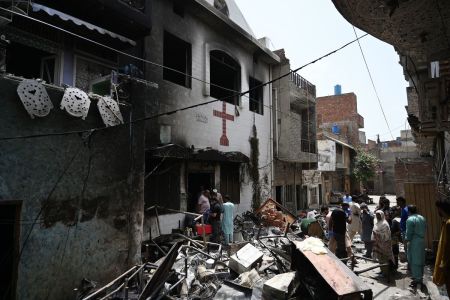As elections loom in Pakistan, Christians fear their voices will not be heard

On Aug. 16, 2023, in Jaranwala, Pakistan, more than two dozen churches and 100 Christian homes were vandalized, burned, and looted by radical religious mobs incited by blasphemy accusations against two Christian brothers. The extensive damage and fear instilled by these attacks left the Christian community reeling and in desperate need.
Now, Christians in the area are looking to the government for help. But with elections looming Feb. 8, many fear their voices will go unheard.
Urgent aid provided by local churches and Christian non-profits proved to be a lifeline to the persecuted families who were left with nothing. After the initial emergency aid ran out, many were left without resources to rebuild long-term and still cannot provide for their families.
Recognizing the magnitude of the damage caused by the riots, the temporary government overseeing the elections in Pakistan pledged support for reconstruction efforts using government funds. Some victimized families received compensation in the form of distributed checks, but apart from the attention of a few interim representatives, mainstream political parties and their leaders have not visited the victims to offer support or solidarity.
The interim government lacks the authority to implement long-term rehabilitation efforts, and the responsibility for infrastructure restoration and community normalization has fallen upon the incoming government. Because funds have run out, construction and rebuilding efforts in Jaranwala have ceased, and the affected community eagerly hopes for support from newly elected officials.
During the run-up to the elections, however, all major political parties have failed to address or mention the challenges of the Christian community, perhaps following the lead of the local lawyers' association, which has boycotted representing Christians and their cases. The Christian community is concerned about their potential lack of inclusion in the annual development budget and other government agendas that will be managed by the soon-to-be-elected officials. They are fearful that continued neglect may prolong their reconstruction efforts and increase their marginalization and vulnerability.
Speaking on condition of anonymity, a local political party leader shared with Global Christian Relief that there is a significant presence of Christian voters in Jaranwala.
Despite the sizable voter base, the leader said he lamented the absence of major political parties' interest in Jaranwala.
He attributed this neglect to a shift in social discourse against Christians following the attacks, which has only further marginalized them. He raised concerns about the electoral process, noting that constituencies with over 15,000 minority voters are being disregarded by mainstream parties, highlighting a broader issue of lack of representation for minorities. He emphasized that minority leaders are often appointed rather than elected, undermining their value in the political process.
A Christian resident and former councilor of Jaranwala who spoke with Global Christian Relief highlighted the significant presence of over 500 Christian households and more than 2,000 voters in the community.
Despite being one of the largest Christian neighborhoods in the area significantly impacted by the attacks in August, none of the major political parties paid a single visit to the community. The difference in election activities is stark compared to previous years, where election camps were set up throughout the neighborhood, and leaders regularly engaged with residents. During this election cycle, no such initiatives have been undertaken.
A Lahore-based human rights defender and minority advocate told Global Christian Relief that victims have felt neglected and isolated from government support, leading to grievances and mistrust against the establishment. He pointed to two main reasons why mainstream politicians have not visited victims in Jaranwala.
First, these leaders are mindful of the public sentiment and religious narrative in the area, which is largely influenced by hardline religious groups. They fear that associating with the victims, who many still perceive as blasphemers, could result in backlash from radical groups and harm their chances of securing majority votes. Second, political leaders may feel embarrassed for not helping the victims over the last six months. As a result, they are reluctant to seek political support from them now.
If Christians in places like Jaranwala are unable to get deeply involved in the political sphere, their issues are likely to go unaddressed after the election. Advocates are calling for increased political participation of religious minorities in Pakistan's electoral process, emphasizing the need for a community to have the right to vote for their own Christian representatives.
Many Global Christian Relief spoke with stressed the urgent need to restore normalcy and peace for the Christian community in the area.
"Authorities must engage stakeholders from both communities and initiate dialogue between political and religious leadership to rebuild interfaith harmony," one Christian said.
James Jacob is a writer for Global Christian Relief (GCR), America’s leading watchdog organization focused on the plight of persecuted Christians worldwide. In addition to equipping the Western church to advocate and pray for the persecuted, GCR works in the most restrictive countries to protect and encourage Christians threatened by faith-based discrimination and violence.





















